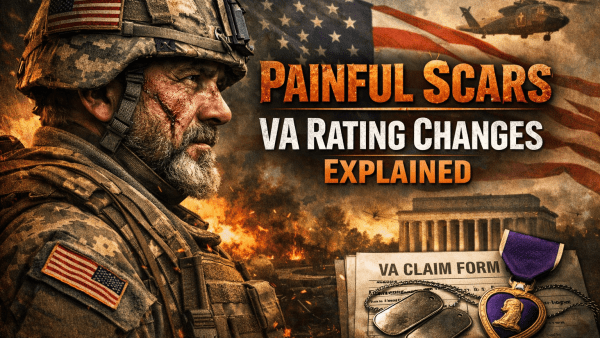Looking for Expert-Level VA Claim Answers?📱Call Us Now! 737-295-2226
Let’s face it: Getting popped for a VA reevaluation of your service-connected disabilities is scary, frustrating, and uncomfortable.
There are numerous factors that affect whether a veteran will need to undergo a VA review examination, also called a Routine Future Examination (RFE).
The VA uses specific criteria to determine the need for VA disability reevaluations, which assesses the ongoing existence and severity of a veteran’s service-connected disabilities.
Generally, veterans can expect a VA reevaluation of a service-connected disability within 2-5 years from an initial rating, unless the condition is deemed “static.”
In this blog post from VA disability expert Brian Reese, we’ll explain how VA disability reevaluations work, including when and why they’re needed, how frequently they occur, and the circumstances under which they may be avoided.
Table of Contents
WATCH: How Often Does the VA REEVALUATE Disability Ratings? Brian Reese Explains Everything You Need to Know!
Summary of Key Points
- Understanding VA Reevaluations and Their Purpose: VA reevaluations, also known as Routine Future Examinations (RFEs), can be a source of stress and uncertainty for veterans. These evaluations are conducted by the VA to determine the ongoing severity and existence of a veteran’s service-connected disabilities. Typically, veterans can expect a reevaluation within 2 to 5 years of their initial rating, unless the condition is deemed “static,” meaning permanent and unlikely to improve. The VA uses specific criteria to determine the necessity of these exams, including evidence of improvement, material changes in the condition, or inaccuracies in the current rating.
- Specialized VA Reexaminations and Exemptions: Certain conditions may require specialized reevaluations. For example, stabilized disabilities that show improvement under VA regulations may be reevaluated 18 to 30 months after improvement is documented. Similarly, conditions like cancer or those requiring major surgeries are often reassessed six months after treatment concludes. However, not all disabilities are subject to reevaluation. Static conditions, disabilities that have not shown improvement over five years, or those rated as permanent in nature are typically exempt. Veterans over 55 years old are also generally exempt unless there is strong evidence of potential improvement.
- Protections Against Arbitrary VA Rating Reductions: The VA provides several safeguards to protect veterans from unnecessary or arbitrary rating reductions. Protected ratings, such as those lasting 5, 10, or 20 years, require substantial evidence of sustained improvement under normal life conditions before reductions can occur. Veterans with Permanent and Total (P&T) status are exempt from reevaluations, ensuring stable VA disability benefits for life.
- How to Determine If Your Disability Is Static: Veterans can determine if their disabilities are considered static by reviewing their VA Rating Decision Letter, Rating Code Sheet, or VA Benefits Summary Verification Letter. These documents indicate whether a condition is static or if future examinations are scheduled. By understanding these processes and protections, veterans can navigate the VA disability reevaluation system with greater confidence and security.
Fellow Veterans: Do You Want to WIN Your VA Disability Claim FASTER?
Are you in need of expert-level VA claim help? Call us right now: (281) 533–6777.
Hi veterans, I’m Brian Reese the VA Claims Insider, and I’m here to help you INCREASE your VA rating FASTER — even if you’ve already filed, been denied, gave up, or don’t know where to start…
If you’re frustrated, underrated, or simply sick and tired of fighting the VA alone, WE’VE GOT YOUR SIX!
Know this: There’s always another path available to you, regardless of past VA claim denials, and we’re committed to helping you achieve VA claim victory.
Our process starts with a one-on-one phone call so we can get to know your unique military service history and VA claim situation.
We’ll identify where you stand now, where you want to go, and how we can make it happen with the right medical evidence.
If we nail your VA claim strategy, the tactics become simple and easy!
Through this gap analysis process, we’ll build a personalized VA claim strategy tailored to your needs — designed to give you the best possible chance of securing the VA rating and compensation you’ve earned for serving our country.
>> Click HERE to book a date/time for your no-obligation consultation with a VA claim expert or call us right now at (281) 533–6777.
When Does the VA Reevaluate Disability Ratings?
The VA has the authority to reevaluate a disability rating at any time if there is suspicion of fraud, even for veterans with a 100% Permanent and Total (P&T) rating.
Normally, veterans can expect a reevaluation within 2 to 5 years of their initial VA rating, unless the condition is classified as “static,” meaning it has been deemed permanent and unlikely to improve over time.
>> Click here to learn more about the 7 types of protected VA ratings
Sources:
M21-1 Criteria for Requesting a VA Disability Reevaluation
The VA schedules a review examination to verify the continued existence or current severity of a service-connected disability when certain conditions are met, including:
- There is a need to verify either the continued existence or the current severity of a disability
- It is likely that a disability has improved
- Evidence indicates there has been a material change in a disability
- The current rating may be incorrect, or
- It is otherwise required by the regulation or diagnostic code (DC) under which the veteran is service-connected (SC).
These evaluations ensure that the veteran’s disability rating remains accurate and fair, reflecting any changes in the condition’s impact on their daily life.
VA Reexaminations: How Often Are They Required?
The timing of VA reexaminations vary based on the nature of the condition and the likelihood of improvement over time:
- VA Reexaminations: Typically scheduled every three years for disabilities expected to improve. In our experience, you can expect a review examination in 2-5 years from your initial rating unless your condition is static.
- Reexaminations for Stabilized Conditions: If a stabilized condition has shown improvement according to VA regulations (38 CFR 3.344), an evaluation may be scheduled 18 to 30 months after the improvement is documented.
- Post-Treatment Reviews for Conditions Like Cancer or Surgery: For conditions requiring major medical intervention (e.g., surgery, cancer treatment), evaluations typically occur six months after the end of the treatment to assess residual effects and adjust the rating accordingly.
When VA Disability Reevaluations Are Not Required
Here are seven instances when the VA should avoid scheduling reevaluations of a veteran’s disability:
- The disability is static
- Findings and symptoms are shown to have persisted without material improvement over five years or more
- The disability is permanent in character and of such nature that there is no likelihood of improvement
- The veteran is over 55 years of age (except under unusual circumstances or where required by regulation)
- The evaluation is the prescribed schedular minimum within its diagnostic code (DC)
- The evaluation is rated at 10 percent or less, or
- The veteran’s combined VA rating would not change even if the reexamination resulted in a reduced evaluation for one or more disabilities.
Pro Tip: If a veteran’s disability rating has been in place for over five years without significant improvement, a higher standard of evidence is required to reduce the rating, according to 38 CFR 3.344.
Are Veterans Over Age 55 Exempt From VA Disability Reexaminations?
Yes, veterans aged 55 and older are generally exempt from routine reexaminations unless there is strong evidence suggesting a possible improvement.
When determining whether to schedule an examination, the VA takes the veteran’s age at the time of the proposed evaluation, not just at the time of the rating decision, into account.
- Scenario: A Veteran born on March 7, 1963, claims an increase in his PTSD, which is currently rated at 50%. Medical evidence supports an increased evaluation to 70%, but also indicates that the Veteran recently began attending weekly counseling sessions with a therapist, and that the prognosis for progress is hopeful and the potential for improvement likely. The claim is forwarded to the rating activity for a decision in February 2017.
- Result and Rationale: The increased evaluation of 70% must be awarded and deemed static, with no future review examination scheduled. If pursued, a routine future examination would be scheduled for performance in February 2020, three years following the rating decision’s preparation. The Veteran, though only 53 years old at the time of the claim’s referral to the rating activity, will have surpassed age 55 by the time the examination is conducted.
What Happens If a VA Review Examination Shows Improvement?
If a review examination indicates that a stabilized disability has improved, the VA must evaluate whether the improvement is sustained and occurs under “ordinary conditions of life,” such as maintaining a job.
This is crucial for conditions rated for over five years, where the VA seeks proof of ongoing improvement before reducing the rating.
If there is uncertainty, the VA may schedule another review 18 to 30 months later to verify that the condition remains stable.
Documenting Cancellations and Missed Appointments
If a review examination is canceled or rescheduled, the VA will document the reason for the change in the veteran’s records.
Veterans who fail to attend scheduled examinations without a valid reason risk having their benefits reduced or discontinued.
It is essential to notify the VA promptly if you need to reschedule to avoid any disruptions in your VA disability benefits.
Mission Critical VA Disability Rules Explained
The VA has specific rules and guidelines that govern how disability ratings are assigned, maintained, and adjusted.
These rules are mission critical for understanding how the VA evaluates a veteran’s condition over time and what protections exist for certain ratings.
Here’s a breakdown of key VA disability rules that can impact your rating:
VA 5-Year Rule:
- Explanation: When a veteran has had a disability rating for five years or more, it is considered “stabilized.” This means that the VA cannot reduce the rating unless there is clear and sustained evidence of significant improvement in the condition under normal life conditions.
- Purpose: This rule protects veterans from having their ratings reduced too easily after an initial period, acknowledging that conditions lasting five years or more tend to be chronic.
- Implications: To reduce a stabilized rating, the VA must demonstrate that the veteran’s condition has consistently improved and that the improvement is likely to be maintained.
VA 10-Year Rule:
- Explanation: If a veteran has received VA disability compensation for a service-connected condition for at least 10 years, the VA is prohibited from terminating the service connection for that condition. However, the VA can still reduce the rating percentage if there is evidence of improvement.
- Purpose: This rule ensures that veterans who have been receiving compensation for a decade are protected from having their service connection terminated, adding a layer of security to their benefits.
- Implications: While a reduction in the rating percentage can occur, the condition will remain service-connected, ensuring that some level of compensation continues.
VA 20-Year Rule:
- Explanation: Once a veteran has maintained the same disability rating for 20 years or more, the VA cannot reduce the rating below the original level. This rule effectively protects long-term ratings from being downgraded unless fraud is involved.
- Purpose: The 20-year rule provides a high level of protection for veterans who have long-standing disabilities, ensuring that their compensation remains stable.
- Implications: This rule guarantees that veterans who have relied on a specific level of benefits for 20 years will not face reductions, adding certainty to their long-term financial planning.
VA 55-Year Old Rule:
- Explanation: Veterans who are 55 years of age or older are generally exempt from routine future examinations. The VA recognizes that it is less likely for older veterans’ conditions to improve significantly, and they do not require reevaluations except in unusual circumstances.
- Purpose: This rule reduces the burden on older veterans to prove ongoing disability status, providing them with a more secure benefits experience.
- Implications: Veterans aged 55 and older are less likely to have their ratings re-evaluated or reduced, providing additional peace of mind.
Protected VA Disability Ratings:
- Explanation: The term “protected ratings” refers to ratings that have reached certain milestones, such as five, 10, or 20 years, which offer specific protections against reductions. Once a rating is considered protected, the VA has stricter requirements for making any changes.
- Purpose: These protections exist to ensure that veterans who have long-standing ratings are not subject to arbitrary or unjustified reductions in their benefits.
- Implications: Protected ratings provide stability and predictability in a veteran’s compensation, allowing for long-term financial planning.
Permanent and Total (P&T) Disability Ratings:
- Explanation: A Permanent and Total disability rating means that the VA considers the veteran’s condition to be completely disabling and unlikely to improve in the future. Veterans with a P&T status are exempt from re-evaluations, and their rating is considered permanent.
- Purpose: The P&T rating provides veterans with assurance that their compensation will not be reduced in the future and allows access to additional benefits, such as Dependents Educational Assistance (DEA) and CHAMPVA for dependents.
- Implications: Veterans with P&T status can receive stable, lifelong benefits without the concern of periodic VA reviews.
How to See If Your VA Disabilities Are Static
Here are three ways to find out if your VA disabilities are “static,” meaning they are not subject to a VA reexamination:
#1. Check Your VA Rating Decision Letter
Your VA rating decision letter typically indicates whether a rating is considered permanent.
Look for phrases such as:
- “No future examinations scheduled”: This usually indicates that your rating is permanent, as the VA does not plan to re-evaluate your condition.
- “Future examination required”: This suggests a temporary rating, meaning the VA expects your condition could improve and plans to reassess it at a later date.
#2. Get a Copy of Your VA Rating Code Sheet
Your VA rating code sheet indicates whether a rating is permanent and meets the definition of a static disability.
If you see “static disability” next to a specific condition that means it is permanent and unlikely to improve over time.
Also, if you see annotations like “no future exams,” this also means the rating is permanent.
#3. View Your VA Benefits Summary Verification Letter
Your VA benefits summary verification letter will indicate whether you’re 100% permanently and totally disabled.
Look for the section that says: “You are considered to be totally and permanently disabled due solely to your service-connected disabilities.”
It will either say “yes” or “no” along with the effective date of your P&T status.
Want Expert-Level Help with Your VA Disability Claim? WE GOT YOUR SIX!
How does VA Claims Insider help veterans?
We make the confusing and frustrating VA claim process EASY through our 8-step proprietary system and one-on-one coaching; we’re the VA Claim EXPERTS you can trust, and YOU are never alone in this fight against the VA!
You’ll also receive VA disability expert Brian Reese’s SEM Method Blueprint—a proven formula that has helped over 25,000 veterans win their VA disability claims faster:
Strategy + Education + Medical Evidence = VA Rating and Compensation You Deserve FASTER!
Start today and unlock an exceptional level of service you deserve for serving our country:
➡️ You’ll hear from a VA Claim Expert over email within 15 minutes of signing up today.
➡️ You’ll hear from your Veteran Coach team within 24 hours of all inquiries during normal business days/hours.
➡️ Our terms are clear and simple: If we don’t win, you don’t pay. You have nothing to lose and everything to gain.
Click the red button below to start the process of winning your VA claim right now!
Veterans: Are You Ready to WIN, SERVICE-CONNECT, and INCREASE Your VA Rating FASTER? We Can Help!

- VA Claims Insider is the #1 most trusted name in VA disability claims.
- Work directly with a VA claims coach who can help lead you to VA claim victory.
- 25,000+ disabled veterans served in our membership programs since 2016.
- 30% average rating increase for veterans who complete our #1 rated Elite program.
- 4.7/5.0 average rating out of 5,500+ total reviews; over 4,500 5-star reviews.
About the Author

Brian Reese
Brian Reese is a world-renowned VA disability benefits expert and the #1 bestselling author of VA Claim Secrets and You Deserve It. Motivated by his own frustration with the VA claim process, Brian founded VA Claims Insider to help disabled veterans secure their VA disability compensation faster, regardless of their past struggles with the VA. Since 2013, he has positively impacted the lives of over 10 million military, veterans, and their families.
A former active-duty Air Force officer, Brian has extensive experience leading diverse teams in challenging international environments, including a combat tour in Afghanistan in 2011 supporting Operation ENDURING FREEDOM.
Brian is a Distinguished Graduate of Management from the United States Air Force Academy and earned his MBA from Oklahoma State University’s Spears School of Business, where he was a National Honor Scholar, ranking in the top 1% of his class.



